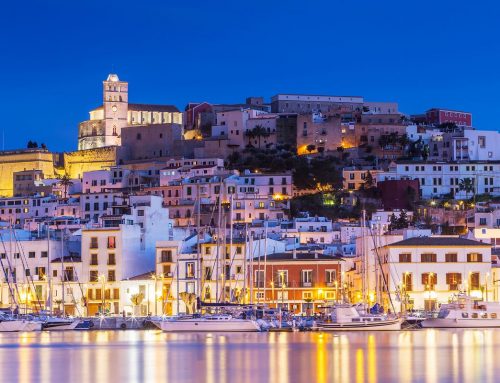The history of Ibiza
Famous for its beaches and its nightlife, Ibiza also holds many surprises for us if we dig into its history. In fact, this small Mediterranean island has seen the succession of many civilizations that have left permanent marks. In this article we therefore see what were the events that have characterized the history of Ibiza.
Geography
the island we know as Ibiza is actually called Eivissa and is part, together with Formentera, S’Espalmador and other small islands, of the Pityusic Islands in the Balearic archipelago, off the coast of Valencia. Due to its position in the western Mediterranean sea, the island was the object of occupations over the centuries by populations trying to expand their territories.
Origins and prehistory
the formation of the Balearic archipelago can be dated to around 8 million years ago. In fact, these islands were formed following the rising of the waters, an event that separated them from Spain. Some findings testify on the island of Ibiza, and in all the Balearics, the presence of the ancient Talaiotic civilization, which developed between the Bronze Age and the Iron Age. Coming from the south of France and the coast of Spain, the Talayots settled here starting from the third millennium BC. The symbol of this ancient civilization are the talayots, in other words conical-shaped constructions, which probably had the function of fortresses or watchtowers.
Phoenicians, Carthaginians and Romans
In 654 BC the Phoenicians built the first port in Ibiza, calling it Ibossim. The island therefore quickly became a strategic point for trade in the Mediterranean. In fact it was quickly appreciated also by the Romans for its wine, marble and lead. Subsequently, with the decline of the Phoenician civilization, the island of Ibiza came under the protection of Carthage. During the Second Punic War, in 209 BC, Ibiza suffered the assault of the Roman army, who tried to conquer it, but nevertheless remained an outpost of Carthage until the end of the war. In fact, with the victory of Rome, it finally became a Roman municipality.
Vandals and Byzantines
In 440 AD, with the annexation of North Africa and Carthage to the kingdom of the Vandals, the Balearics and Ibiza were also conquered. This also happened due to the fact that the islands constituted a strategic point to counter the Roman advance and to carry out raids in the Mediterranean, including the Sack of Rome in 455. Subsequently in 532, the Byzantine emperor Justinian I declared war on the Vandals . In fact, he could count on the support of some populations until then subdued. Finally, after a two-year war, the Vandals surrendered, returning the lands of the Vandal kingdom, including Ibiza and the Balearics, to the Byzantines.
Visigoths and Saracens
With the Byzantine Empire, Ibiza experienced a period of peace for about 75 years. In the sixth century, however, the Visigoths’ incursions into Spain undermined this tranquility. Nonetheless, the Balearics remained, at least formally, Byzantine until the Saracen raids of the eighth century. In fact, on the Spanish coast various emirates spread, which integrated the Arab culture with the local one. In particular Ibiza and the Balearics were annexed to the Umayyad Caliphate in 902.
The Aragonese
An important turning point in the history of Ibiza took place in the 13th century. In fact, during this period, in order to put an end to the incursions of the pirates of Mallorca, the Catalan merchants asked for help from the King of Aragon, James I. The Muslim populations began to retreat as well to Africa. The last to yield to the Aragonese were the islands of Ibiza and Formentera. Finally, in 1236 the islands were repopulated thanks to the transfer of peasants from Empúries, a commercial city in Catalonia. The Balearic Islands were still the subject of disputes between the Aragonese and the Kingdom of Mallorca, conquered in 1286 by Alfonso III and subsequently taken over by James II in 1298, with the treaty of Argilers. They were then definitively annexed to the Kingdom of Aragon in 1344 and then absorbed by the Kingdom of Spain in 1713.
The British and the return to Spain
1 713 was an important year for the Balearics. In fact, with the treaties of Utrecht, stipulated to put an end to the war of the Spanish succession, Menorca was ceded to the English who occupied it for almost a century. Following the peace of Amiens in 1802, which obliged England to return the conquests obtained until then to France and its allies, the archipelago returned to Spain.
Autonomy
D uring 1931 and the birth of the First Republic, the first statute for the autonomy of the Balearics was drafted, but canceled by the civil war. In fact, the coup d’état of 1936 gave rise to the Spanish civil war which saw the nationalist forces of the military junta opposing those of the legitimate government. In this phase of Spanish history, Ibiza and Mallorca passed to the insurgents until the end of the war in 1939 which saw the establishment of the dictatorship of Francisco Franco. The Balearic Islands will have to wait many years after the end of the Second World War, before being recognized as autonomous with the 1983 Statute.
N ow that we have analyzed the history of Ibiza and the Balearics, it will be easier for you to understand the importance of this small Mediterranean island. In fact, our advice is to find the footprints of its past by visiting it! If you are wondering where to stay we suggest one of the wonderful apartments that we provide. You can also choose one of our luxury villas to make your stay in Ibiza unforgettable!




